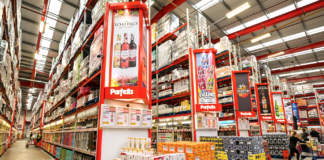Better Wholesaling attended this year’s FWD Conference at St George’s Park in Staffordshire, on the site of the English national football team’s training camp. Here are ten things we learned from this year’s incarnation – called Winning in Wholesale – of the annual event.
1. Economic downturn ‘biggest challenge’
An FWD survey of its wholesaler members found that the economic downturn is their “biggest challenge” (41%). Followed by the National Living Wage (27%), illicit trade (13%), Amazon (11%), food price deflation (6%), and the sugar tax (3%)
2. Don’t fear the Brexit
James Bielby, FWD chief executive, noted a potential positive of Brexit, in that some tobacco policy is driven by Europe. Andrew Selley, of Bidvest Foodservice urged wholesalers to be mindful of the fact that in the medium term, little will change, “so let’s have clarity and sanity – keep calm and be the best.”
3. National Living Wage rage
According to Bielby, wholesalers’ wage bills went up by 0.7% on average after the National Living Wage (NLW) came in. They’ll be an average of 3.7% higher by 2020, potentially costing the sector £59m, or 2,600 jobs. Bielby noted: “It’s only right that people get a decent day’s pay for a decent day’s work, but the government needs to bear in mind the impact on business.”
4. Sugar tax
Bielby believes that due to uncertainty in government caused by Brexit, there’s “real potential” for the sugar tax to be delayed. The policy – created by George Osborne – could also be in line to be held up as Osborne has now been replaced as Chancellor by Philip Hammond.
5. See more for C-stores
Tom Fender, of consultancy Fizz Enterprises, told delegates that convenience stores only get around 2.4% of shoppers’ total expenditure – meaning there is “97.6% still to go for”. He noted that the convenience share of the grocery market has been static over the last two years at 21.2%.
6. More likes for social media needed
Fender also argued that c-stores and symbol groups don’t have enough of a presence on social media. He told delegates: “Are we doing enough with technology? Like it or loathe it, tech will influence everything. The world is changing and we need to move quick and embrace the change.” He noted that US c-store chain Wawa has 1.2m Facebook friends, but that the top ten UK c-store groups only have 300k combined.
7. Growth in foodservice ‘here to stay’
Mary Barnard of Mondelez International told delegates of her belief that growth in foodservice is “absolutely here to stay”. She said that the US is close to 50 per cent of all food being consumed outside the home, so the opportunity to grow to a third or half of that is “definitely here”.
8. Consumers need to be more impulsive
Phil Jenkins of Sugro talked of the growing range of outlets for impulse. He added: “We want to encourage impulse. We want to see non-priced promo work to gain consumers’ confidence so that they will go in to independent retailers and say, ‘I’ll have that.’”
9. Invoice query issues
Jenkins also told delegates: “Every time I talk to wholesalers, they say they spend most of the week sorting out invoice queries. These are big businesses with accountants.” He added that incorrect pricing on invoices and delivery errors are impacting members’ businesses, and the length of time taken to rectify mistakes is “too long.”
10. Uber allies needed
Andrew Muldoon, of Booker, talked of how disruptive technologies and businesses are changing consumer expectations. He said: “Uber doesn’t directly impact on the wholesale delivery business, but it does change expectations. Millennials have higher expectations and are very closely connected.”







